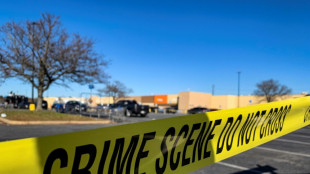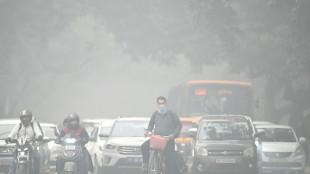
-
 Tunisia women herb harvesters struggle with drought and heat
Tunisia women herb harvesters struggle with drought and heat
-
Trump threatens to take back control of Panama Canal

-
 India's architecture fans guard Mumbai's Art Deco past
India's architecture fans guard Mumbai's Art Deco past
-
Secretive game developer codes hit 'Balatro' in Canadian prairie province

-
 Large earthquake hits battered Vanuatu
Large earthquake hits battered Vanuatu
-
Beaten Fury says Usyk got 'Christmas gift' from judges

-
 First Singaporean golfer at Masters hopes 'not be in awe' of heroes
First Singaporean golfer at Masters hopes 'not be in awe' of heroes
-
Usyk beats Fury in heavyweight championship rematch

-
 Stellantis backtracks on plan to lay off 1,100 at US Jeep plant
Stellantis backtracks on plan to lay off 1,100 at US Jeep plant
-
Atletico snatch late win at Barca to top La Liga

-
 Australian teen Konstas ready for Indian pace challenge
Australian teen Konstas ready for Indian pace challenge
-
Strong quake strikes off battered Vanuatu

-
 Tiger Woods and son Charlie share halfway lead in family event
Tiger Woods and son Charlie share halfway lead in family event
-
Bath stay out in front in Premiership as Bristol secure record win

-
 Mahomes shines as NFL-best Chiefs beat Texans to reach 14-1
Mahomes shines as NFL-best Chiefs beat Texans to reach 14-1
-
Suspect in deadly Christmas market attack railed against Islam, Germany

-
 MLB legend Henderson, career stolen base leader, dead at 65
MLB legend Henderson, career stolen base leader, dead at 65
-
Albania announces shutdown of TikTok for at least a year

-
 Laboured Napoli take top spot in Serie A
Laboured Napoli take top spot in Serie A
-
Schick hits four as Leverkusen close gap to Bayern on sombre weekend

-
 Calls for more safety measures after Croatia school stabbings
Calls for more safety measures after Croatia school stabbings
-
Jesus double lifts Christmas spirits for five-star Arsenal

-
 Frankfurt miss chance to close on Bayern as attack victims remembered
Frankfurt miss chance to close on Bayern as attack victims remembered
-
NBA fines Celtics coach Mazzulla and Nets center Claxton

-
 Banned Russian skater Valieva stars at Moscow ice gala
Banned Russian skater Valieva stars at Moscow ice gala
-
Leading try scorer Maqala takes Bayonne past Vannes in Top 14

-
 Struggling Southampton appoint Juric as new manager
Struggling Southampton appoint Juric as new manager
-
Villa heap pain on slumping Man City as Forest soar

-
 Suspect in deadly Christmas market attack railed against Islam and Germany
Suspect in deadly Christmas market attack railed against Islam and Germany
-
At least 32 die in bus accident in southeastern Brazil

-
 Freed activist Paul Watson vows to 'end whaling worldwide'
Freed activist Paul Watson vows to 'end whaling worldwide'
-
Chinese ship linked to severed Baltic Sea cables sets sail

-
 Sorrow and fury in German town after Christmas market attack
Sorrow and fury in German town after Christmas market attack
-
Guardiola vows Man City will regain confidence 'sooner or later' after another defeat

-
 Ukraine drone hits Russian high-rise 1,000km from frontline
Ukraine drone hits Russian high-rise 1,000km from frontline
-
Villa beat Man City to deepen Guardiola's pain

-
 'Perfect start' for ski great Vonn on World Cup return
'Perfect start' for ski great Vonn on World Cup return
-
Germany mourns five killed, hundreds wounded in Christmas market attack

-
 Odermatt soars to Val Gardena downhill win
Odermatt soars to Val Gardena downhill win
-
Mbappe's adaptation period over: Real Madrid's Ancelotti

-
 France's most powerful nuclear reactor finally comes on stream
France's most powerful nuclear reactor finally comes on stream
-
Ski great Vonn finishes 14th on World Cup return

-
 Scholz visits site of deadly Christmas market attack
Scholz visits site of deadly Christmas market attack
-
Heavyweight foes Usyk, Fury set for titanic rematch

-
 Drone attack hits Russian city 1,000km from Ukraine frontier
Drone attack hits Russian city 1,000km from Ukraine frontier
-
Former England winger Eastham dies aged 88

-
 Pakistan Taliban claim raid killing 16 soldiers
Pakistan Taliban claim raid killing 16 soldiers
-
Pakistan military courts convict 25 of pro-Khan unrest

-
 US Congress passes bill to avert shutdown
US Congress passes bill to avert shutdown
-
Sierra Leone student tackles toxic air pollution


US Supreme Court's right-wing skeptical of using race in college admissions
The conservative-majority US Supreme Court appeared poised on Monday to ban the use of race as a factor in deciding who gets into America's elite universities.
The top US court heard nearly five hours of arguments on the use of race in admissions to Harvard and the University of North Carolina (UNC) -- respectively the oldest private and public institutions of higher education in the country.
Harvard and UNC, like a number of other top US schools, consider an applicant's race as a factor in trying to ensure a diverse student body and representation of minorities, a policy known as "affirmative action."
It emerged from the Civil Rights Movement in the late 1960s to help address the legacy of discrimination in higher education against African Americans.
The suits against Harvard and UNC were brought by a group known as Students for Fair Admissions, which claims that race-conscious admissions policies discriminate against equally qualified applicants of Asian American origin.
"The racial preference is operating to the disadvantage of Asian American applicants," Patrick Strawbridge, attorney for Students for Fair Admissions, told the court.
"When you use race, you're telling applicants that their race matters," Strawbridge said, calling it "inherently divisive."
"It gets us further away from a world where the government treats race as irrelevant," he said.
Strawbridge's arguments appeared to get a sympathetic hearing from the conservative justices on the court, setting the stage for another potential historic reversal like in June, when the high court overturned its landmark 1973 "Roe v. Wade" decision guaranteeing a woman's right to abortion.
Conservatives currently enjoy a solid 6-3 majority on the Supreme Court, including three justices nominated by former president Donald Trump, a Republican.
- 'Don't have a clue what it means' -
Justice Clarence Thomas, a longtime opponent of affirmative action, said he could not think of another case "where the court deferred to the alleged discriminator."
"I've heard the word diversity quite a few times and I don't have a clue what it means," he added. "It seems to mean everything for everyone."
Conservative justices John Roberts, Brett Kavanaugh and Amy Coney Barrett repeatedly pressed the attorneys for Harvard and UNC about when there would be an "end point" to affirmative action.
"Your position is that race matters because it's necessary for diversity," Roberts said. "It's not going to stop mattering at some particular point.
"You're always going to have to look at race because you say race matters to give us the necessary diversity."
Justice Elena Kagan and the other two liberal justices on the court pushed back against the arguments put forward by Students for Fair Admissions.
"For decades, this court has rightly recognized that student body diversity is a compelling interest that can justify limited consideration of race in university admissions," Kagan said.
"That holding recognizes a simple but profound truth -- when students of all races and backgrounds come to college and live together and learn together they become better colleagues, better citizens and better leaders," she said.
"In your view, it really wouldn't matter if there was a precipitous decline in minority admissions," Kagan said to Strawbridge. "Your brief says it just doesn't matter if our institutions look like America.
"Doesn't it?" she asked.
- 'Cause racial diversity to plummet' -
The administration of Democratic President Joe Biden and dozens of major American companies have weighed in on the side of the universities.
"A blanket ban on race-conscious admissions would cause racial diversity to plummet at many of our nation's leading educational institutions," US Solicitor General Elizabeth Prelogar told the court.
Previous courts have upheld affirmative action -- in 2016 by a single vote -- but the policy has been controversial from the start, and a number of white students have mounted legal challenges over the years, claiming "reverse discrimination."
Nine states have banned affirmative action at public universities including California, where voters did so in a ballot proposition in 1996 and rebuffed an attempt to revive the policy in 2020.
In a 1978 decision -- Regents of the University of California v. Bakke -- the Supreme Court banned the use of quotas in university admissions as unconstitutional.
But the court said race or ethnic origin can be considered as one factor among others in admitting students to ensure a diverse student body and to combat previous discrimination that could have prevented marginalized students from being accepted to those schools.
Ketanji Brown Jackson, the first Black woman on the Supreme Court, sat out the Harvard case because she has served previously on the Board of Overseers at the school.
E.Borba--PC



